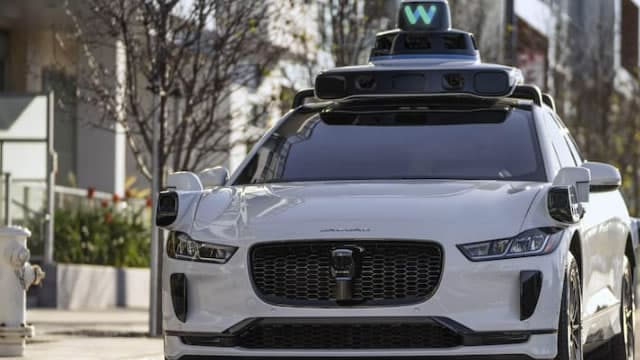Uber and Waymo launch fully autonomous Robotaxi service in Atlanta

Summary
Uber Technologies Inc (NYSE:UBER) shares jumped over 7% following the launch of a fully autonomous robotaxi service in Atlanta, integrating Waymo's self-driving Jaguar I-PACE vehicles directly into the Uber app. This strategic partnership allows riders to choose driverless electric vehicles alongside traditional rides, signaling a significant step in urban mobility. The move enhances Uber's market position, offers potential long-term cost savings, and highlights the accelerating adoption of autonomous vehicle technology, presenting a positive outlook for investors.
Uber and Waymo Launch Fully Autonomous Robotaxi Service in Atlanta: A New Era for Ride-Hailing
Uber Technologies Inc (NYSE:UBER, ETR:UT8) shares surged over 7% on Tuesday, marking a significant milestone for the ride-hailing giant. The catalyst for this impressive stock performance was the official launch of a fully autonomous robotaxi service in Atlanta, a strategic collaboration that integrates Waymo's cutting-edge self-driving Jaguar I-PACE vehicles directly into the Uber app. This groundbreaking initiative allows riders in Atlanta to be seamlessly matched with driverless electric vehicles, alongside the traditional human-driven options, fundamentally transforming the urban transportation landscape.
The Strategic Partnership: Uber and Waymo's Synergistic Approach
This partnership between Uber and Waymo, Alphabet's (NASDAQ:GOOGL) autonomous driving subsidiary, represents a powerful synergy. Uber brings its vast network, established user base, and sophisticated logistics platform, while Waymo contributes its industry-leading autonomous vehicle technology, refined over billions of miles of real-world and simulated driving. The integration means that when a user requests a ride through the Uber app in designated Atlanta zones, they may be offered a Waymo autonomous vehicle, providing a novel and potentially more efficient transportation experience. This move is not just about convenience; it's a bold step towards a future where autonomous vehicles play a central role in urban mobility.
Market Implications and Competitive Landscape
The launch in Atlanta is more than just a localized service; it's a strong signal to the market about the accelerating pace of autonomous vehicle adoption. For Uber, this expands its service offerings and positions it at the forefront of the autonomous ride-hailing revolution. It also provides a significant competitive edge against rivals who are still heavily reliant on human drivers. The ability to deploy driverless vehicles could eventually lead to substantial cost savings by eliminating driver wages, insurance complexities, and other operational overheads associated with human-driven fleets. This long-term cost efficiency could significantly boost Uber's profitability margins.
Furthermore, this development puts pressure on other players in the autonomous vehicle space and traditional ride-hailing companies to accelerate their own self-driving initiatives. The success of this pilot in Atlanta could pave the way for expansion into other major U.S. cities, creating a scalable model for autonomous ride-hailing. The move also highlights the increasing trend of strategic alliances in the tech sector, where companies leverage each other's strengths to achieve common goals and dominate emerging markets.
Investment Insights for UBER Shareholders
For investors, the Atlanta robotaxi launch is a strong positive indicator for Uber's future growth trajectory. The immediate 7% jump in stock price reflects market optimism about the potential for autonomous vehicles to unlock new revenue streams and improve operational efficiency. Key considerations for investors include:
- Long-term Profitability: The transition to autonomous fleets promises significant reductions in operational costs, which could translate into higher profit margins over time. Investors should monitor the scalability and efficiency gains from this pilot.
- Market Leadership: This partnership solidifies Uber's position as a leader in innovative urban mobility solutions. Continued successful deployment could enhance its brand value and market share.
- Technological Advancement: The integration of Waymo's technology demonstrates Uber's commitment to leveraging cutting-edge solutions. This focus on innovation is crucial for sustained growth in a rapidly evolving industry.
- Regulatory Environment: While promising, the expansion of autonomous services is subject to regulatory approvals and public acceptance. Investors should keep an eye on policy developments in other potential expansion markets.
This strategic move by Uber and Waymo is a testament to the ongoing evolution of the transportation sector. As autonomous technology matures and gains wider acceptance, services like the Atlanta robotaxi will likely become commonplace, reshaping how people move within cities and offering compelling opportunities for forward-thinking investors.